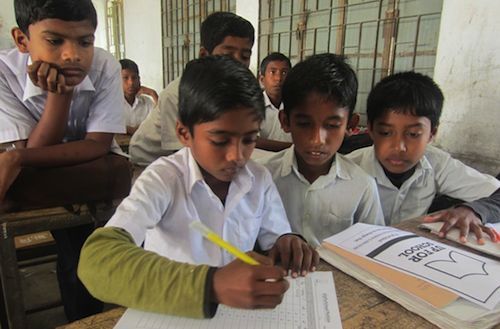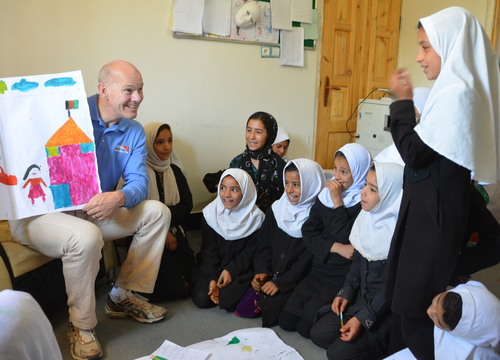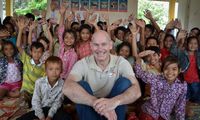By Kevin J. Jenkins, President and Chief Executive Officer, World Vision International
Getting vulnerable and poor children into schools that are fit for learning is an area in which the faith community can make a decisive difference.
We should be deeply concerned for the 59 million children who never go to school at all, but also with hundreds of millions who attend but learn little or nothing. The scarcity of trained teachers and access to materials written in children's first languages is a modern crisis and a huge missed opportunity. Who has the scale and concern to act on this?
Well, five out of every six people in the world hold a faith which, when it is focused on specific social ambitions, changes behavior.
World Vision - a Christian, child-focused organisation - is enthusiastically engaging people of all faith backgrounds to act on the shared virtues which can lead to improvements in child wellbeing. This is an era in which 'religion' is being blamed for many social ills. We should remind ourselves of the tremendous positive impact that people of faith continue to have in society - including in education.
Faith-based groups are at the forefront of supporting learning for millions of hard-to-reach vulnerable children.
In the early days of the Syrian refugee crisis, I was moved by the symbolism of emergency classes being run by World Vision's Christian staff, hosted in an Islamic training institution in Lebanon with the support of its Muslim staff.
I saw a similar thing in September in Afghanistan, as local mullahs gave support for World Vision projects making classes available to returned refugees and urban street children. Of the 29 countries with more than half a million children out of school, 26 are in fragile states like Afghanistan, Syria and its refugee-hosting neighbors.
Formal aid grants are drying up for education. These are countries where it takes a little faith to imagine progress!
The faith community's approach to effective education, from the Aga Khan Foundation's use of computers in Kenyan schools, to Catholic Relief Services work in conflict-affected Africa, is modern and innovative.
We measure ourselves by the outcomes of education, not the infrastructure. How many children can read and write, and how well?
A lot of effort goes in to researching which interventions produce results. Evidence-based literacy programs unlock human potential and are the cornerstone of development which lasts. Extra years of good education - especially for girls - lead to better health and employment opportunities, thriving economies and stable societies.
This research into the best approaches available led us to implement a program called Literacy Boost, a copyrighted tool designed, developed, and owned by Save the Children. The program regularly assesses children's reading skills, trains teachers and motivates communities to support children in fun out-of-school activities. Using it, we are revolutionising education for 1.5 million girls and boys in 15 of the world's least-educated countries.
Research in Ethiopia shows Literacy Boost enabled more than twice as many children to read with understanding, in a single year, than their non-participating peers. Thousands of youth volunteers run reading clubs in which 750,000 children are learning to read for enjoyment and education. Fewer kids drop out of school early, which is a serious threat in Ethiopia. And 45,000 teachers have more confidence thanks to courses in best-practice techniques.
The problem is so great that, even with numbers like those, we can't build a world in which every child has the literacy skills to succeed without a concerted effort by the global community - including faith leaders.
That's why World Vision is an enthusiastic partner in the Global Faiths Coalition for Education. We also support the #UpForSchool petition. Of 10 million global signatures, we submitted 1.5 million from Bangladesh, where the campaign sparked a national movement.
Each statistic is a human life. I met Rabeya, a Bangladeshi teen, who was taken out of school by her father and held at home for weeks as he prepared her for marriage. Akter Samsunnahar, a quiet 16-year-old girl who is unrelenting in her desire to see her peers stay in school, visited every day with other volunteer members of her Khulna Child Forum. They debated with Rabeya's father, until finally he gave in.
Rabeya wept openly as she described to me the difference between facing life as an uneducated teen wife, and her new life as a student with an independent future.
Our faith's instinct towards the dignity of the person is powerful. Combine that with the best in learning science and we can transform education. Let's provide a brighter future for millions of children like Rabeya. It's one of the great privileges and imperatives of our generation.
--
Kevin Jenkins became President and Chief Executive Officer of World Vision International in October 2009. His goal in leading the Christian relief, development and advocacy organisation is to achieve meaningful, lasting change for the world's most vulnerable children. He previously served the organisation as a sponsor, volunteer, fund-raiser and Board member with World Vision Canada.



